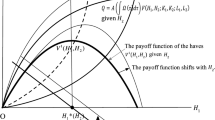Abstract
We consider an OLG economy with endogenous investment in human capital. Heterogeneity in individual human capital levels is modelled by a distribution of innate ability across agents. This distribution is common knowledge but, at young age, no agent knows his/her ability. The production of human capital depends on each individual’s investment in education. This investment decision is taken only after observing a signal which is correlated to his/her true ability, and which is used for updating beliefs. Thus, a better information system affects the distribution of human capital in each generation. Assuming separable and identical preferences for all individuals, we derive the following results in equilibrium: (a) If the relative measure of risk aversion is less (more) than 1 then more information raises (reduces) income inequality. (b) When a risk sharing market is available better information results in higher inequality regardless of the measure risk aversion.
Similar content being viewed by others
References
Aghion P. (2002) Schumpeterian growth theory and the dynamics of income inequality. Econometrica 70, 855–882
Azariadis C., Drazen A. (1990) Threshold externalities in economic development. Qu. J. Econ. 105, 501–526
Benabou R. (1996) Equity and Efficiency in human capital investment: The local connection. Rev. Econ. Stud. 63, 237–264
Blackwell D. (1951) Comparison of experiments. In: Proceedings of the second Berkeley symposium on mathematical statistics, 93–102
Blackwell D. (1953) Equivalent comparison of experiments. Ann. Math. Stat. 24, 265–272
Demougin D., Fluet C. (2001) Ranking of information systems in agency models: an integral condition. Econ. Theory 17, 489–496
Eckwert B., Zilcha I. (2001a) The value of information in production economies. J. Econ. Theory 100, 172–186
Eckwert, B., Zilcha, I. The effect of better information on growth and welfare. In: Working Paper #13–01, The Foerder Institute for Economic Research, Tel Aviv University (2001b)
Feldman M., Gilles C. (1985) An expository note on individual risk without aggregate uncertainty. J. Econ. Theory 35, 26–32
Galor O., Tsiddon D. (1997) The distribution of human capital and economic growth. J. Econ. Growth 2, 93–124
Galor O., Zeira J. (1993) Income Distribution and Macroeconomics. Rev. Econ. Stud. 60, 35–52
Glomm G., Ravikumar B. (1992) Private investment in human capital: endogenous growth and income inequality. J. Polit. Econ. 100, 818–834
Green J. (1981) The value of information with sequential futures market–Econometrica 49, 335–358
Hassler J., Mora V.R. (2000) Intelligence, social mobility, and growth. Am. Econ. Rev. 90(4): 888–908
Hirshleifer J. (1971) The private and social value of information and the reward to incentive activity. Am. Econ. Rev. 61, 561–574
Hirshleifer J. (1975) Speculation and equilibrium: information, risk and markets. Q. J. Econ. 89, 519–542
Juhn C., Murphy K.M., Brooks P. (1993) Wage inequality and the rise in return to skill. J. Polit. Econ. 101(3): 410–442
Khan M.A., Sun Y. (1999) Weak measurability and characterizations of risk. Econ. Theory 13, 541–560
Kim S.K. (1995) Efficiency of an information system in an agency model. Econometrica 63(1): 89–102
Lehmann E. (1988) Comparing location experiments. Ann. Stat. 16, 521–533
Loury G. (1981) Intergenerational transfers and the distribution of earnings. Econometrica 49(4): 843–867
Milgrom P.R. (1981) Good news and bad news: representation theorems and applications. Bell J. Econ. 12, 380–391
Orazem P., Tesfatsion L. (1997) Macrodynamic implications of income-transfer policies for human capital investment and school effort. J. Econ. Growth 2, 305–329
Orosel G.O. (1996) Informational efficiency and welfare in the stock market. Europ. Econ. Rev. 40, 1379–1411
Persico N. (2000) Information acquisition in auctions. Econometrica 68, 135–148
Rubinstein, Y., Tsiddon, D. Coping with technological changes: the role of ability in making inequality so persistent. In: Working Paper. The Foerder Institute for Economic Research, Tel Aviv University (2002)
Schlee E. (2001) The value of information in efficient risk sharing arrangements. Am. Econ. Rev. 91(3): 509–524
Sylwester K. (2002a) A model of public education and income inequality with a subsistence constraint. South. Econ. J. 69(1): 144–158
Sylwester K. (2002b) Can education expenditures reduce income inequality. Econ. Educ. Rev. 21, 43–52
Viaene J.M., Zilcha I. (2002) Capital markets integration, growth, and income distribution. Euro. Econ. Rev. 46, 301–327
Author information
Authors and Affiliations
Corresponding author
Additional information
We are grateful to Alex Cukierman, Zvi Eckstein, Yona Rubinstein and Daniel Tsiddon. An anonymous referee made extremely useful comments and suggestions. Financial support from the German-Israeli Foundation for Scientific Research and Development (GIF) is gratefully acknowledged.
Rights and permissions
About this article
Cite this article
Eckwert, B., Zilcha, I. The Effect of Better Information on Income Inequality. Economic Theory 32, 287–307 (2007). https://doi.org/10.1007/s00199-006-0120-8
Received:
Accepted:
Published:
Issue Date:
DOI: https://doi.org/10.1007/s00199-006-0120-8




